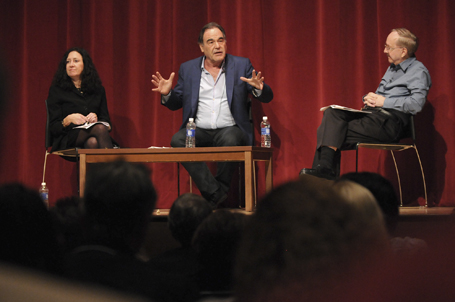Friday, Nov 22, 2013
The University drew Oliver Stone to campus, brought students to Washington, D.C., and offered two new classes for semester-long reflection
by Adam Grybowski
A slate of events and classes have drawn Rider University students into the national conversation surrounding the 50th anniversary of President John F. Kennedy’s assassination. The University brought Oliver Stone to campus to discuss his film on the subject, took students to Washington, D.C., and offered two special classes this fall.
Dr. Thomas Simonet’s course, “The JFK Assassination in Film and Media,” analyzes representations of the event in different forms of media, and Dr. James Ottavio Castagnera’s course, “The Kennedy Assassination 50 Years Later: Who Dunit?,” asks students to build a case for their theory on who killed Kennedy.
Eager to teach the class, Castagnera was also skeptical it would draw interest. Not only were most students not alive when Kennedy was shot, some of their parents had yet to be born. “For most students this is ancient history,” he says.
As it turns out, the classes are packed. Extra seats had to be added for both courses.
Nearly all of his students lack a personal or emotional tie to the event. Castagnera, who was 16 when Kennedy was killed, attributes their interest to the mythic quality of the JFK story, not to mention the unmatched glamour the president and his wife, Jacqueline Kennedy Onassis, brought to American politics. “I think most people find it an interesting mystery, along the lines of Jack the Ripper,” he says. “It’s got the stuff of romance and it’s a heck of a story.”
In addition to the two classes, students and the Rider community were offered the opportunity to attend a daylong conference on Nov. 2 focused on the films of Oliver Stone, with an appearance by the filmmaker.
The conference, which was organized by Dr. Cynthia Lucia, director of the Film and Media Studies Program and English professor, gave the Rider community first-hand access to an artist who helped shape the JFK story decades after the shot was fired. Stone answered questions from the audience, as well as Lucia and Cineaste magazine’s editor-in-chief, Gary Crowdus. Reflecting on his research of the assassination, he said, “This is not me making up history. This is history.”
The mystery burst back into American consciousness with the release of Stone’s JFK in 1991. One of the most controversial political movies ever made, it appeared after several critical successes for Stone. The Academy Award-winning director of Platoon was now responsible for stoking conspiracy theories that deeply complicated the findings of the Warren Commission, which was charged with investigating the murder.
Stone’s career would never be the same. “After JFK I had crossed a watershed,” he said at the conference. “I could never come back. It was vilifying and humiliating.” A corollary to the controversy, the federal government, spurred by the movie, released new JFK-related documents.
Not being able to shake the caricature of provocateur-filmmaker became “a bore,” Stone told a packed audience in the Bart Luedeke Center. “You make more movies, you work hard, you refresh yourself and you get dragged back to the cliché.”
In addition to the conference, Stone’s movies were also projected weekly on campus this semester.
Stone’s effect of juicing conspiracy theories may live on. Surveying his students on the first day of class, Castagnera, associate professor of Legal Studies and American Studies, reports that 29 of 30 believed the assassination was a result of conspiracy. Each of them has spent the semester building a case around their judgment, and the final exam will ask them to prove their theory in a way that would hold up in court.
On Nov. 9, about 50 students traveled to the Newseum in Washington, D.C., which has on display two new exhibits on the 35th president, as well as an original documentary.
The result of these cross-departmental efforts has been to bring context to a presidency cut short by a bullet and a man who was a potent if complicated symbol of change. Kennedy called for the end of segregation and inspired a moon landing. He put boots on the ground in Vietnam and averted nuclear war in Cuba. The youngest president ever elected to office, he relieved its oldest. No Catholic before him had ever held the presidency.
“The assassination was a shock wave,” says Lucia, who came home as a 9 year old on Nov. 22, 1963, to find her mother crying. “There was suddenly the feeling of returning to a time we had hoped we transcended.”

